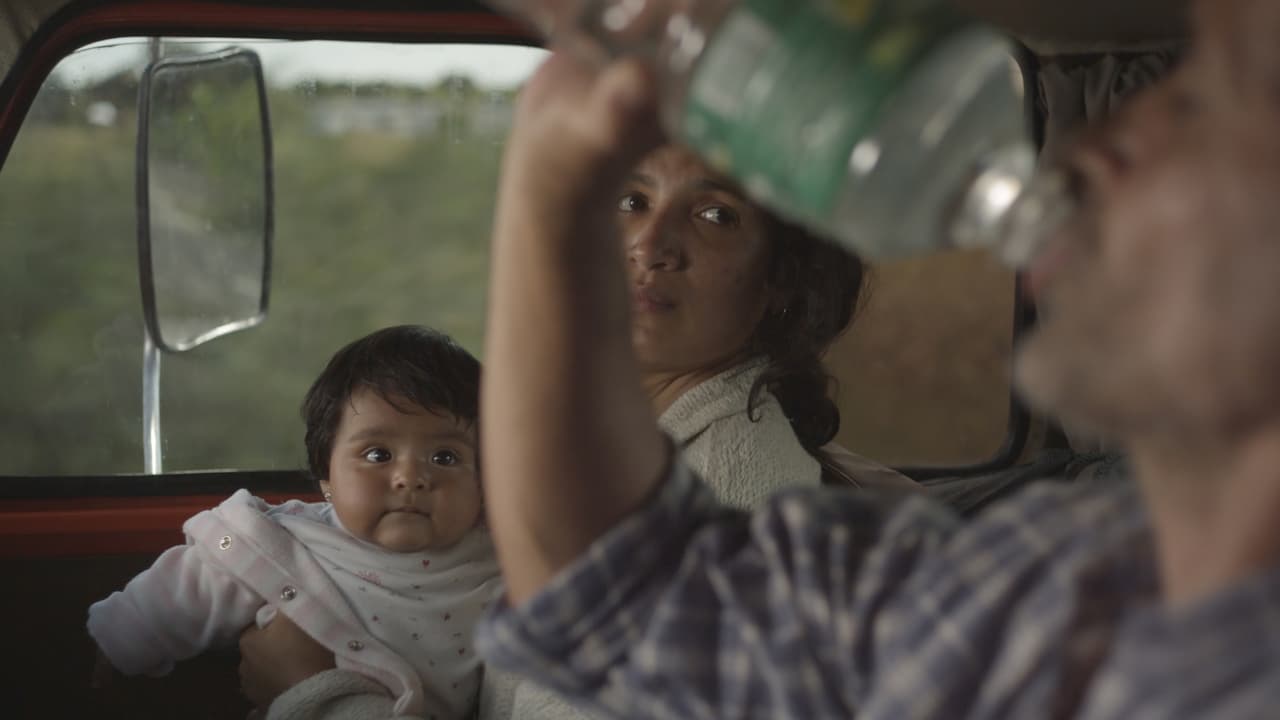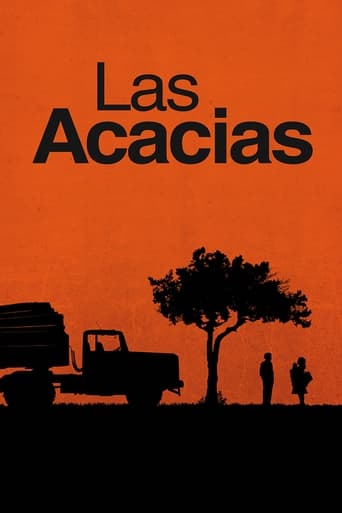

The Acacia (a.k.a. thorn tree, whistling thorn, wattle) is a genus of shrubs and trees, often spine-bearing (outside Australia). Its name derives from the Greek word for thorn. The tree has long been associated with the shores of the Nile, although its varieties are found worldwide.The Acacia's reputation precedes its début as film title. It has come to symbolize resurrection and immortality. Egyptian mythology ties the acacia to the tree of life. In Freemasonry it embodies purity, even endurance of the soul. Acacias also fill needs for timber and firewood.Las Acacias opens as Rubén, a lorry driver, wanders among timber harvesters in Paraguay as they pile high his flatbed with acacia boles. He will cross the Argentine border to take acacia timber to market in Buenos Aires.At the request of his boss, Rubén will also take Jacinta (of indigenous origin) and, to his surprise, her 8-month-old infant with him. Jacinta has arranged to visit her cousin in Buenos Aires and will probably look for work there.It's a long trip. Much of the film is shot looking into the lorry cabin through the windows on either side of the flatbed tractor. Dialog is spare and deliberate. On the occasions when Jacinta is asked about the baby's father, for instance, she replies — without a trace of bitterness — "The baby has no father." Rubén and Jacinta exchange first names. She teaches Rubén some words in her native language. Rubén defers to Jacinta and the baby by smoking outside when the lorry is stopped. She waits patiently, as he does for her when twice he pulls his rig over so that she can phone her cousin.The cast has only three members — one of whom can't yet talk and is prone to incontinence — but all are well chosen. It would be hard to imagine other actors who could fill the roles as well.Rubén and Jacinta, hardened but not deadened, have gracefully resigned themselves to their lots. Each has an incomplete family. Neither seems to be expecting anything special from life. Both have facial contours that reward the repeated scrutiny of tight shots.Whether by precocious talent or by NSA connivance, Anahí (that's the baby) puts in a stellar performance. Not only does she (the Actor) seem mysteriously disposed to respond on cue flawlessly, but her Character (much like the Actor) also brings out the best in Rubén and Jacinta. It's likely that the two of them would otherwise have passed the trip in awkward silence. (Those who, like me, consider all babies of Anahí's age to be more or less indistinguishable from one another have another think coming.)Las Acacias extols, without exalting, the quiet delights that arise unbidden in everyday life. Pablo Giorgelli (director and writer) and writer Salvador Roselli acknowledge what is mundane about road culture. And they show us how prosaically enjoyable those encounters could still be in the Argentina of 2011, as they might have been in mythic 1950s America. Despite the vagaries and precariousness of that life, therein lies contentment of a sort. Speech figures far less prominently in it than do glances, gestures, civility, and trust born of experience.Nothing explodes into flame in this film. No one gets shot or tasered or even spit at. No voices are raised. No one hoodwinks anyone else. No lawyers, no strivers, no moneychangers, no Mr Burnses. No phonies. In other words, another iteration of magical realism.A hint of resolution comes just before the credits roll. We fade to black full of hope, if not change.Las Acacias ends as it began: with shots of acacias. The kind that grow and are felled, and the kind that move about on two legs.
... View MoreThis is one of the most boring, pointless films I have ever sat through. I fell asleep three times. It is just a truck drive through Argentina where the driver takes 60 minutes of the viewers time to pluck up the courage to ask his lady passenger for a date - to go for another truck ride next week. The reviews that I read before seeing this, alluded to much depth and in the performances which more than made up for the lack of dialogue. I was expecting a far higher level of subtlety and gentle revealing of the characters and their stories. Little was revealed and that was clumsily told. No cultural insight or visuals about the places they drive through. Little background or depth to either character. Just lots of driving ... oh and a few toilet stops for the baby. Dull would be a compliment. The baby pulls some cute faces.
... View MoreA truck driver hauling lumber from the forests of Paraguay to the markets in Buenos Aires is required by his boss to take a woman and her child with him. He is none too pleased, but as they travel on the mysterious 'something' happens. Not much of a story-line on the face of it, but as we journey with them we see the gradual, almost imperceptible, emergence of bonds of affection that could be turning to love.The tale is told with very little dialogue, few settings (for most of the time we are in the truck cab) and no music. But the effect is enthralling. The acting is uniformly strong; you never doubt that you are watching 'real' people.Of particular note is that of the three leading actors, the one who puts in the most remarkable of the excellent performances is the infant (played by Nayra Calle Namani, who could not be more than a year old). I would love to know how the director and the adult actors managed to coax this child into behaving as it does. It's magic!This movie has a simplicity and honesty that is very moving. The faces say so much without words, so unlike the theatrical, fake emotions displayed in the previous movie I saw, The Deep Blue Sea. The images stayed with me well after I had left the theatre.(Viewed at Screen 3, The Cornerhouse, Manchester, UK 04.12.11)
... View MoreA middle-aged truck driver's long years of hauling lumber from Asuncion, Paraguay to Buenos Aires is etched on his grizzled face. Looking as if he hasn't shaved in weeks, maybe months, his body language displays a passive solitude, as if he has become reconciled to a world of emptiness. Winner of the Camera d'Or for the best first feature in Cannes, Pablo Giorgelli's Las Acacias is a work of deceptive simplicity, a film that captures the essence of human longing mostly through facial expressions, glances, and gestures. Though it is mainly shot inside the cab of a truck and has very little dialogue, it never feels claustrophobic or dull, its natural performances allowing us to feel as if we are observing events in real time.The driver, Rubén (German de Silva), is transporting a load of acacia wood to Buenos Aires and has agreed to bring Jacinta (Hebe Duarte), a young Paraguayan woman with him at the request of his boss. When he finds out that the woman, heavily loaded down with suitcases, is also bringing her five-month old daughter, Anahi (Nayra Calle Mamani), he says nothing, but the annoyed look on his face tells the story. Nothing is said for the first thirty minutes as they begin their 1500 kilometer journey, but the silence is not oppressive. Rather, there is simply quiet as the languid motion of the truck sways to the rhythm of the road. Giorgelli said that "I wanted you to feel the fatigue of this long journey," and we do. It is long but never tiring, however.As the camera reflects on the passing scenery and the images the driver sees through his rear-view mirror, we observe the eyes of the driver, his passenger, and the baby whose look is the most expressive of all. We know nothing of his background or that of the woman's. Ruben's frozen inability to express emotion begins to melt, however, as Jacinta's warmth and the baby's sweet smile awakens in him a sense of his lost humanity. During the course of the trip they begin to open up, slowly revealing their troubled past. He tells Jacinta that he has a son that he hasn't seen in eight years, and she tells him that Anahi has no father.Jacinta talks to her daughter in the ancient Guarani language and Ruben asks her to translate. When Anahi begins to cry, Rubén quiets her by giving her a cup to play with, and a barely articulated affection emerges. Written by Salvador Roselli, Las Acacias is a film of emotional richness that has no extraneous conversation, enigmatic symbolism, or background music. It is a film where nothing happens and everything happens, that understands that silence alone, in the words of British author Karen Armstrong, "is appropriate for what lies beyond words." A work of deep and abiding humanity, Las Acacias is one of the best films of the year.
... View More